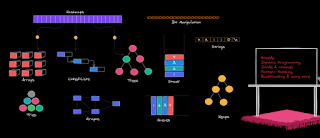There are two types of artificial intelligence, Strong
AI and Weak AI. Strong AI refers to a system that can genuinely think and carry
out tasks independently, much like a human. Weak AI refers to the gadgets'
appearance of intelligence despite their inability to do these activities on
their own. The majority of the examples in our environment are weak AI. Strong
AI is still in its very early stages.
●
Strong
AI allows the machine to truly think and carry out activities independently,
much like a person. Even though machines with weak artificial intelligence
cannot complete these tasks on their own, they are designed to appear clever.
●
Strong
AI stores algorithms to aid with their decision-making in many circumstances,
however, All actions in Weak AI are entered by humans.
●
Strong
AI has no suitable examples because it is still in its infancy, yet Weak AI has
many instances because it has been used frequently.
●
In
Strong AI, the machine can make decisions and have a mind of its own, but in
Weak AI, the machine can only mimic human behavior.
●
Weak
AI technology is used to make the machine perform the pre-planned tasks
correctly whereas Active AI technology is more focused on making the device
look realistic.
●
Researchers
place more emphasis on strong artificial intelligence, whereas engineers who
want weak artificial intelligence to function do so in various activities.
AI is further divided into four categories:
Type I AI: Reactive machines
Type II AI: Limited memory
Type III AI: Theory of mind
Type IV AI: Self-awareness
Reactive Machines:
These AI systems are the most basic and react to input
following pre-established principles. They are unable to create memories or
draw on the past to guide present choices.
Limited Memory:
These AI systems can draw from the past to guide the
decisions they make today, but they have access to a finite quantity of data.
Theory of Mind:
These
AI systems can comprehend the thoughts, feelings, and intentions of others,
enabling them to act and interact in more complex ways.
Self-awareness:
These AI systems are capable of understanding their
selves and having a sense of self. understanding of one's limitations and
feelings.
CONCLUSION
Fortunately, there are several materials out there that
can teach us more about AI and its potential advantages. For instance, online
training courses and programs can give professionals the knowledge they need to
comprehend the fundamentals of AI technology. to help job candidates be ready
for interviews with famous international companies and firms. You can take up
courses from Tutort Academy to gain knowledge about artificial intelligence
there are others as well Data science, Data structures and algorithms, Machine
learning etc. The academy provides the best Data structure Tutor , Data
structure training in Bangalore.





No comments:
Post a Comment